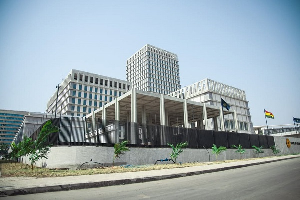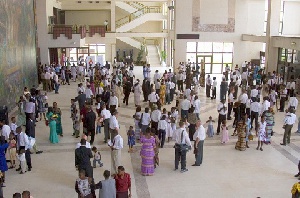Work on the new seed laboratory being built in Tamale for the Ghana Seed Inspection Unit (GSIU) of the Ministry of Food and Agriculture is about 80 per cent complete.
Currently, structural and painting works had been completed, while the generator and modern laboratory equipment are to be installed.
Similar facilities are being constructed in Bolgatanga and Wa in the Upper East and Upper West regions respectively, with funding from the USAID through its Feed the Future Ghana Agriculture Technology Transfer (ATT) project.
It is to provide seed testing that would enable northern region farmers have access to high quality seeds for increased yields.
Mr Christopher Y. Akai, Head of the Tamale Seed Unit, speaking in an interview with the Ghana News Agency at the project site in Tamale, said the facility would modernize the operations and functions of GSIU, which is responsible for supervising and ensuring that seed produced and sold in the region was certified and of high quality.
He said, as part of the support by the ATT Project, experts from Iowa State University in the US would conduct training for staff of GSIU on the management and use of the new equipment after its installation.
“With this facility our capacity to conduct laboratory seed evaluations and tests such as moisture content, purity and moisture condition will be efficient. For instance we will have the capacity to increase our seed germination testing from about 20 to 50 lots,” he said.
Mr Akai explained that with the new equipment, which were of international standard, the GSIU seed testing unit would achieve more accuracy and precision in seed testing.
Mr Mike Dockrey, Chief of Party for the Agriculture Technology Transfer Project, said the facility was one of the many technology supports the project was providing to Northern Ghana’s seed sector, in partnership with the Ministry of Food and Agriculture, CSIR-SARI, and the GSIU.
This, he said, was to strengthen and dramatically expand improved seed production and make quality seeds available to farmers.
“This project is also strengthening relevant industry associations to improve member services such as training, advocacy and the establishment of standards for self-regulation”, he said.
Mr Dockery noted that the ATT project, working with its MOFA and research partners, and through private sector seed producers and agro-dealers, was helping to sustain improved seed production, based on farmers’ demand.
“Development of improved maize, rice and soy seed at a scale that makes it readily available to local farmers can transform food production in northern Ghana. Completion and full operation of these three new regional GSIU seed testing laboratories is a critically important step in assuring that highest quality seed is being sent from seed producers to the farmers’ fields, he said.
"We’re very happy to see this first seed testing laboratory in Tamale nearing completion and this will push for early completion and start-up of the two remaining ones before the harvest season begins”, he stated.
Business News of Saturday, 18 July 2015
Source: GNA












